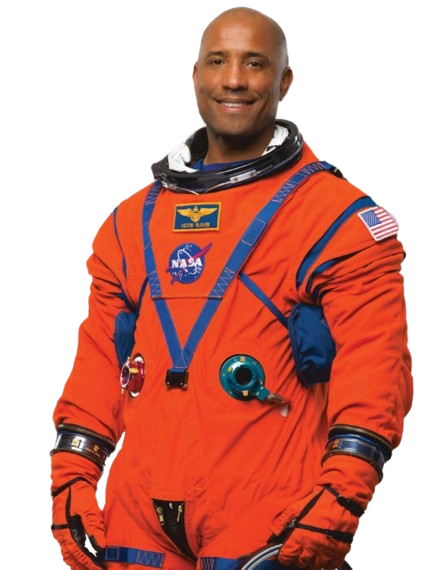Versuchen GOLD - Frei
Victor Glover
The Week Junior Science+Nature UK
|Issue 69
Meet an astronaut who will be blasting off to the Moon next year.
-

In 2024, astronaut Victor Glover will be part of the first crew to travel to the Moon in more than 50 years. As the pilot, he will fly the spaceship, named Orion, around the Moon but Orion won’t land on the surface. “Our mission – Artemis II – is to make sure that the Orion spacecraft is safe for the more complicated missions,” Glover told The Week Junior Science+Nature. “It’s just one step on that really long journey that is eventually going to wind up with sending the first human on to Mars.” Glover must also make sure all systems are working properly. “If that toilet breaks, we’re going to have four unhappy people up there.”
Life in space
Glover is an experienced astronaut and, between 2020 and 2021, spent nearly six months living on the International Space Station (ISS). The ISS is a space base orbiting planet Earth. Lots of scientific experiments are performed there.
Life in space is strange. First of all, the small amount of gravity (the force that pulls things towards the ground) on the ISS compared to Earth means that people and heavy objects float about easily. This not because there is no gravity, but because the spacecraft, the crew, and everything on board is falling toward Earth. Since they all fall at the same speed, everything appears to be
To the Moon… and beyond
The aim of the Artemis missions, Glover told
Diese Geschichte stammt aus der Issue 69-Ausgabe von The Week Junior Science+Nature UK.
Abonnieren Sie Magzter GOLD, um auf Tausende kuratierter Premium-Geschichten und über 9.000 Zeitschriften und Zeitungen zuzugreifen.
Sie sind bereits Abonnent? Anmelden
WEITERE GESCHICHTEN VON The Week Junior Science+Nature UK

The Week Junior Science+Nature UK
FIGHTING THE FREEZE
Claire Karwowski uncovers nature's wildest ways of fighting the winter freeze.
6 mins
Christmas 2025
The Week Junior Science+Nature UK
Cook up bioplastic decorations
Make your own eco-friendly ornaments.
1 min
Christmas 2025

The Week Junior Science+Nature UK
Should we switch off Christmas lights?
They brighten up the festive season, but they can have a negative impact on the environment.
1 mins
Christmas 2025
The Week Junior Science+Nature UK
Three spectacular illuminations
Glow Wild, Wakehurst
1 min
Christmas 2025

The Week Junior Science+Nature UK
THE LAST DAYS OF POMPEII
For the first time, an immersive exhibition about the destruction of the ancient Roman city of Pompeii has opened in London.
1 min
Christmas 2025

The Week Junior Science+Nature UK
Wildlife watch
Jenny Ackland unveils a winter wonderland of natural delights this festive season.
1 mins
Christmas 2025
The Week Junior Science+Nature UK
Make Snow globes
Create the perfect Christmas gift.
1 min
Christmas 2025

The Week Junior Science+Nature UK
Maggie Aderin-Pocock
Meet the scientist \"blasting off into space\" at the Christmas Lectures.
3 mins
Christmas 2025
The Week Junior Science+Nature UK
Make vegan eggnog
Whip up a dairy-free festive winter warmer that is perfect for cold nights.
1 min
Christmas 2025

The Week Junior Science+Nature UK
Octopuses
Meet the colour-changing, shape-shifting, fortune-telling aliens of the seas.
2 mins
Christmas 2025
Translate
Change font size

